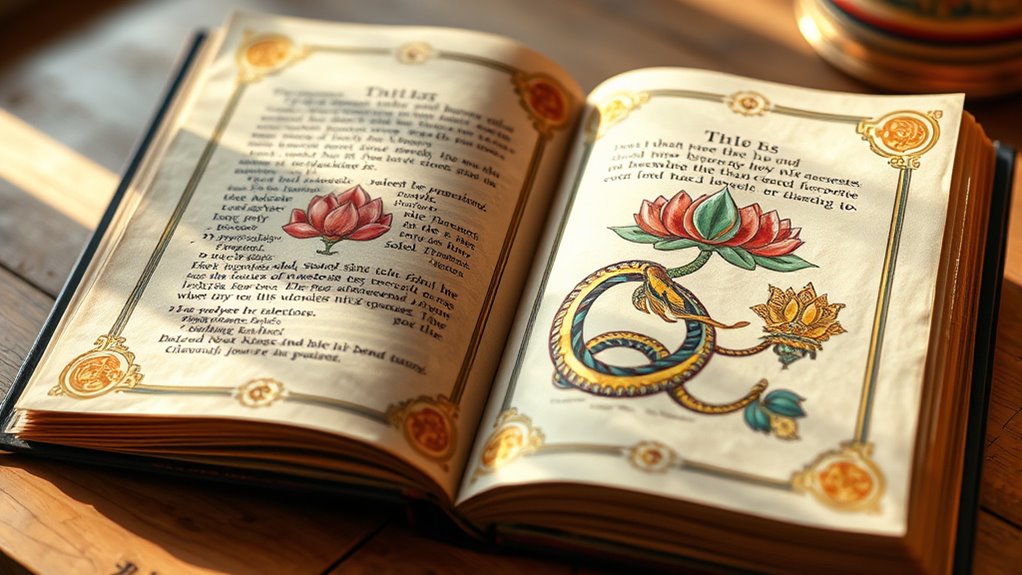The Book of Life is an ancient symbol found in many cultures and religions that records your actions and determines your destiny. It represents divine justice, mercy, and accountability, reminding you of the importance of moral choices. Often seen as a divine ledger or spiritual guide, it connects your life to a higher purpose and moral order. To discover how this symbol influences faith, morality, and personal growth, explore its deeper meaning.
Key Takeaways
- The Book of Life is a divine record of souls’ deeds, symbolizing moral accountability and divine justice across cultures.
- It determines eternal fate during judgment, listing the righteous and guiding their path to salvation or spiritual growth.
- Historically, it represents divine truth, wisdom, and the universal desire for moral order and divine oversight.
- In modern interpretation, it symbolizes inner knowledge, spiritual development, and the soul’s journey beyond physical life.
- It serves as a moral compass, encouraging responsibility, reflection, and connection to divine justice and mercy.
Origins and Historical Context of the Book of Life
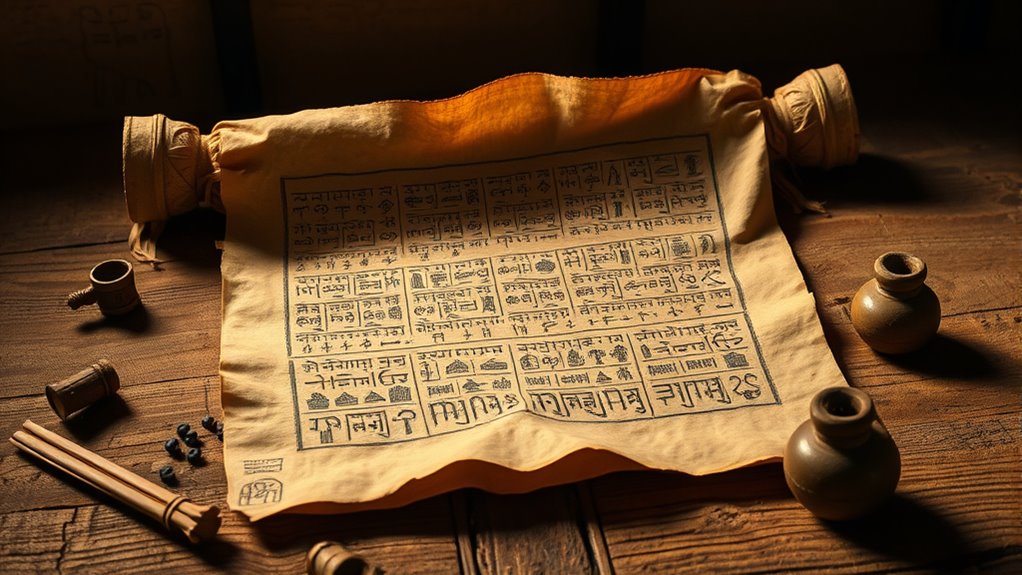
The concept of the Book of Life has ancient roots that trace back to multiple religious and cultural traditions. It functions as a cosmic ledger, recording the deeds and destiny of souls. In early civilizations, this soul registry served as a divine record, determining who would be granted favor or faced judgment. Cultures like the Egyptians and Persians believed in a spiritual record that tracked moral behavior and the afterlife journey. The Book of Life symbolized divine justice and accountability, emphasizing that each person’s actions are noted and weighed. Over centuries, this idea evolved, influencing later religious texts and beliefs. Its enduring presence highlights humanity’s desire for moral order and the belief that a divine record exists beyond our mortal understanding.
The Book of Life in Biblical Traditions
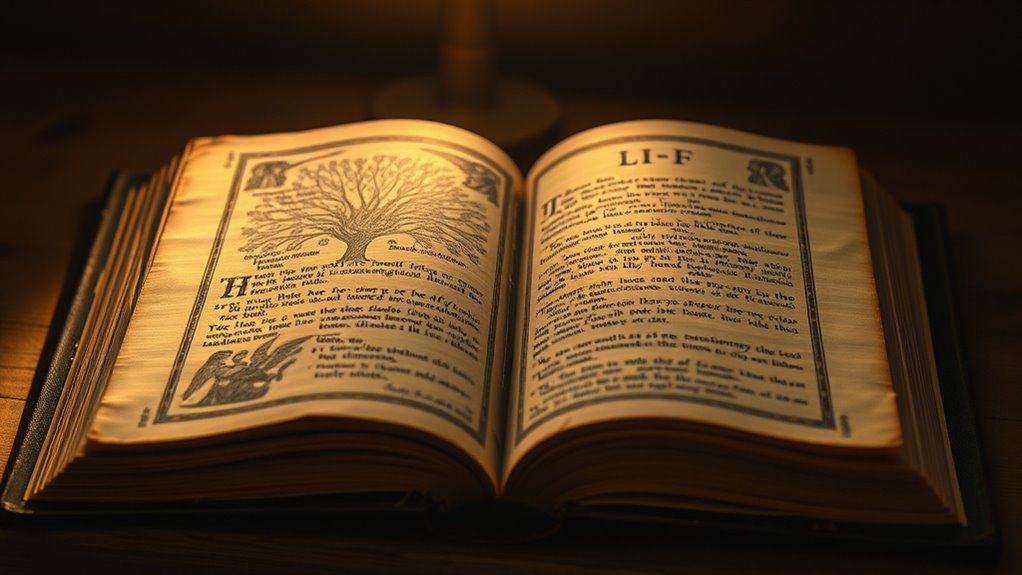
In biblical traditions, the Book of Life acts as divine record keeping, listing those who are granted eternal life. It serves as a symbol of judgment and accountability, determining who is saved or condemned. Understanding this helps you see how promises of eternal life are connected to moral choices and divine justice.
Divine Record Keeping
Biblical traditions portray the Book of Life as a divine ledger in which God records the names of those deemed righteous or faithful. This cosmic record acts as a spiritual archive, holding the names of the saved and the chosen. You can think of it as a celestial registry, maintained by divine authority, that reflects your spiritual standing. Here’s a simple look at its significance:
| Aspect | Explanation |
|---|---|
| Cosmic Records | The universe’s spiritual database, kept by God. |
| Names in the Book | Those who follow faith are inscribed here. |
| Purpose | To identify those eligible for divine blessing. |
This divine record keeping emphasizes God’s role as a divine historian, safeguarding the faithful’s names for eternity.
Judgment and Accountability
When the time of judgment comes, the Book of Life becomes the ultimate record that determines your eternal fate. It holds your moral accountability, reflecting your choices and actions. Your soul redemption depends on whether your deeds align with righteousness. As your life is reviewed, you’re called to account for both good and bad behaviors. The Book emphasizes personal responsibility and the importance of living morally upright. It reminds you that every action, no matter how small, contributes to your eternal outcome. The judgment isn’t just about punishment or reward but about how well you’ve upheld moral standards. Ultimately, the Book of Life challenges you to seek forgiveness and endeavor for a life that merits a place within its sacred pages.
Eternal Life Promises
The Book of Life not only records your moral choices but also holds the promise of eternal life for those who live righteously. In biblical traditions, this promise centers on soul preservation after death, assuring believers that their good deeds and faith will secure a favorable afterlife. Many afterlife beliefs emphasize that your soul continues beyond physical death, and the Book of Life serves as a divine record of your righteousness. When your name is written in it, you’re granted access to eternal life, free from suffering and death. This hope motivates you to align your actions with spiritual principles, reaffirming that living morally isn’t just about the present but also about securing your everlasting existence.
Symbolism and Meaning Across Cultures
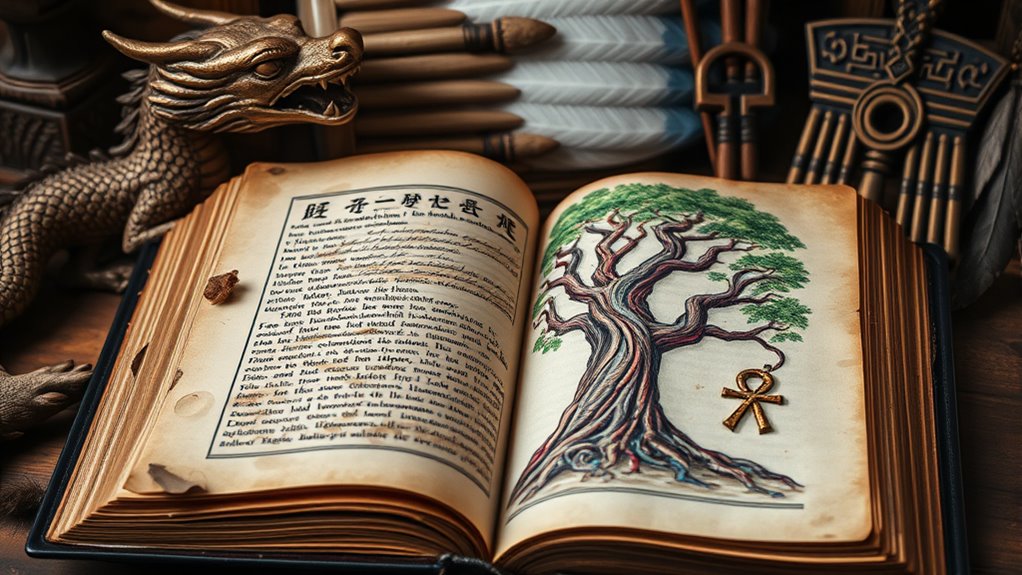
Across different cultures, the book of life often symbolizes knowledge, wisdom, and the divine order. It appears in sacred texts and spiritual symbolism, representing the record of human deeds or divine truth. You’ll find it in mythologies, where it’s seen as a divine ledger, recording every soul’s journey. In some traditions, it’s a metaphor for enlightenment or divine insight. The symbolism extends to concepts of fate and destiny, emphasizing the universe’s ordered nature.
- Sacred texts depict it as a divine record of deeds
- Spiritual symbolism links it to enlightenment and truth
- It signifies divine knowledge across cultures
- Often associated with fate, destiny, and judgment
- Serves as a reminder of moral accountability
The Role of the Book of Life in Morality and Judgment

In many spiritual traditions, the Book of Life functions as a moral ledger that determines a soul’s fate after death. It records your actions, emphasizing moral accountability and soul remembrance. Your deeds, both good and bad, are inscribed, guiding judgment. This process encourages you to reflect on your life choices, fostering moral growth. The table below illustrates how the Book of Life influences moral judgment:
| Good Deeds | Bad Deeds |
|---|---|
| Lead to positive remembrance | Lead to negative consequences |
| Enhance your moral standing | Result in spiritual setbacks |
| Contribute to soul remembrance | Impair your moral record |
This highlights how your actions shape your spiritual journey, emphasizing the importance of moral accountability in the afterlife.
Modern Interpretations and Spiritual Perspectives

Modern spiritual perspectives often see the Book of Life as a symbolic record of your soul’s journey rather than a literal ledger. Contemporary views encourage you to interpret it as a reflection of your actions, growth, and intentions. This approach invites you to see the Book of Life as a personal guide for self-awareness and spiritual evolution.
Contemporary Spiritual Views
Have you ever wondered how contemporary spiritual views interpret the concept of the afterlife? Many believe it’s a journey of soul purification, where the soul releases burdens and heals. Some see the afterlife as a chance for spiritual awakening, helping you understand your true nature. Others suggest that consciousness continues beyond physical death, evolving through different planes. Many emphasize personal growth, where actions influence your next phase. Reincarnation is also popular, with the soul returning to learn lessons. Overall, these views focus on inner development and enlightenment, rather than punishment or reward. By embracing these perspectives, you see death as a transformative process that offers opportunities for growth and spiritual evolution.
Symbolic Interpretations
Contemporary spiritual perspectives often see the stories and symbols in the Book of Life as reflections of inner truths rather than literal events. You interpret the symbolic imagery as representations of your soul’s journey, growth, and lessons. Spiritual symbolism helps you understand complex concepts like karma, destiny, and spiritual awakening through familiar images and narratives. Instead of focusing on literal details, you view the symbols as tools for self-discovery and reflection. For example, a serpent might symbolize transformation, while a ladder signifies spiritual ascent. These interpretations encourage you to look inward, recognizing that the stories serve as metaphors for your personal evolution. Embracing this perspective deepens your connection to spiritual truths hidden within the symbolic imagery of the Book of Life.
The Significance of the Book of Life Today
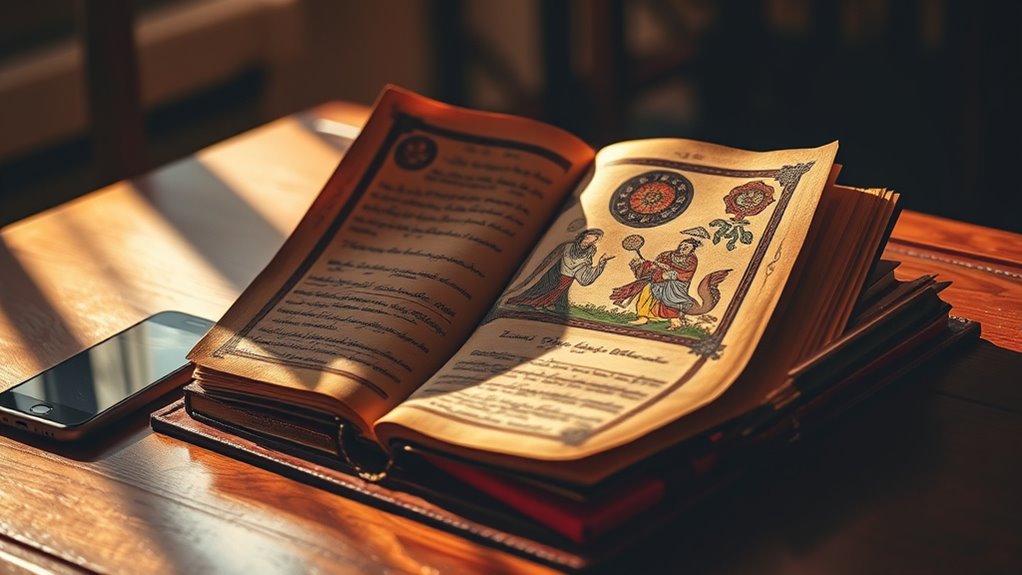
Why does the Book of Life still matter today? It serves as a reminder of soul preservation and destiny determination. Knowing your name is written in this divine record encourages you to live purposefully. It emphasizes accountability and the importance of aligning your actions with spiritual truths. Today, the Book of Life symbolizes hope and divine justice, guiding you through moral choices. It reminds you that your life isn’t random but part of a greater plan. Recognizing its significance helps you stay focused on your spiritual journey.
The Book of Life reminds us of purpose, accountability, and divine justice guiding our spiritual journey today.
- Reinforces the importance of moral living
- Inspires you to reflect on your purpose
- Highlights divine justice and mercy
- Encourages accountability for your actions
- Connects you to a higher destiny
Frequently Asked Questions
How Does the Book of Life Differ Across Religious Denominations?
You might notice that different religious denominations interpret the Book of Life through various salvation narratives and views on divine judgment. Some see it as a record of the righteous, while others believe it determines eternal destiny. These differences shape their teachings on salvation, grace, and judgment, influencing how followers live their faith. Ultimately, each denomination’s perspective reflects their unique understanding of divine judgment and the importance of being written in the Book of Life.
Are There Any Known Physical Representations or Artifacts Related to the Book of Life?
Ever wonder if there are physical artifacts linked to the Book of Life? While no definitive ancient manuscripts or sacred relics directly claim to be the Book of Life, some religious traditions possess ancient texts and relics symbolizing divine judgment or records of deeds. These artifacts serve as tangible connections to spiritual beliefs, but the actual Book of Life remains a spiritual concept rather than a physical object you can see or hold.
How Has Popular Culture Depicted the Concept of the Book of Life?
In popular culture, you see the book of life as a symbol of moral and divine judgment. Films, books, and art often portray it as a sacred record where every person’s deeds are written, determining their fate. You might imagine it as a divine ledger, with characters facing judgment based on their actions. This depiction emphasizes themes of morality, accountability, and divine justice, making the concept resonate deeply in storytelling.
What Are Some Common Misconceptions About the Book of Life?
Imagine believing the book of life records every detail of your future, but that’s a common misconception. Many see it as a literal, all-encompassing record, yet it’s more a symbolic interpretation rooted in mythological origins. People often misunderstand it as a fixed fate instead of a metaphor for moral choices and destiny’s fluid nature. This mythological concept reminds us that life’s story isn’t predetermined but shaped by our actions.
Is There a Connection Between the Book of Life and Afterlife Beliefs?
You might wonder if the Book of Life connects to afterlife beliefs, and it often holds ritual significance in various traditions. People see it as a spiritual symbolism representing judgment or eternal destiny. This connection influences how cultures view the afterlife, emphasizing moral actions and divine judgment. The book’s role in these beliefs highlights its importance in understanding spiritual journeys and the hope for a positive afterlife outcome.
Conclusion
As you reflect on the Book of Life, remember it’s like Pandora’s box—holding both mystery and truth. It reminds you that your choices shape your destiny, echoing the eternal judgment of the Divine. Whether seen as a literal record or a symbol of conscience, it invites you to live with integrity. Embrace its lessons today, knowing your story is being written—just like the heroes of old who faced their own fates.

